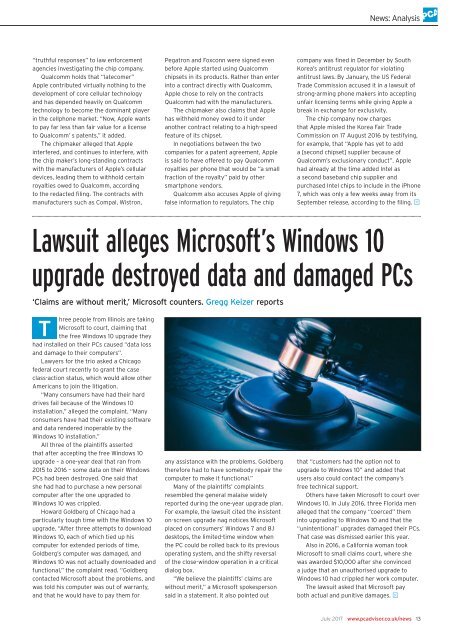You also want an ePaper? Increase the reach of your titles
YUMPU automatically turns print PDFs into web optimized ePapers that Google loves.
News: Analysis<br />
“truthful responses” to law enforcement<br />
agencies investigating the chip company.<br />
Qualcomm holds that “latecomer”<br />
Apple contributed virtually nothing to the<br />
development of core cellular technology<br />
and has depended heavily on Qualcomm<br />
technology to become the dominant player<br />
in the cellphone market. “Now, Apple wants<br />
to pay far less than fair value for a license<br />
to Qualcomm’ s patents,” it added.<br />
The chipmaker alleged that Apple<br />
interfered, and continues to interfere, with<br />
the chip maker’s long-standing contracts<br />
with the manufacturers of Apple’s cellular<br />
devices, leading them to withhold certain<br />
royalties owed to Qualcomm, according<br />
to the redacted filing. The contracts with<br />
manufacturers such as Compal, Wistron,<br />
Pegatron and Foxconn were signed even<br />
before Apple started using Qualcomm<br />
chipsets in its products. Rather than enter<br />
into a contract directly with Qualcomm,<br />
Apple chose to rely on the contracts<br />
Qualcomm had with the manufacturers.<br />
The chipmaker also claims that Apple<br />
has withheld money owed to it under<br />
another contract relating to a high-speed<br />
feature of its chipset.<br />
In negotiations between the two<br />
companies for a patent agreement, Apple<br />
is said to have offered to pay Qualcomm<br />
royalties per phone that would be “a small<br />
fraction of the royalty” paid by other<br />
smartphone vendors.<br />
Qualcomm also accuses Apple of giving<br />
false information to regulators. The chip<br />
company was fined in December by South<br />
Korea’s antitrust regulator for violating<br />
antitrust laws. By January, the US Federal<br />
Trade Commission accused it in a lawsuit of<br />
strong-arming phone makers into accepting<br />
unfair licensing terms while giving Apple a<br />
break in exchange for exclusivity.<br />
The chip company now charges<br />
that Apple misled the Korea Fair Trade<br />
Commission on 17 August 2016 by testifying,<br />
for example, that “Apple has yet to add<br />
a [second chipset] supplier because of<br />
Qualcomm’s exclusionary conduct”. Apple<br />
had already at the time added Intel as<br />
a second baseband chip supplier and<br />
purchased Intel chips to include in the iPhone<br />
7, which was only a few weeks away from its<br />
September release, according to the filing. J<br />
Lawsuit alleges Microsoft’s Windows 10<br />
upgrade destroyed data and damaged <strong>PC</strong>s<br />
‘Claims are without merit,’ Microsoft counters. Gregg Keizer reports<br />
T<br />
hree people from Illinois are taking<br />
Microsoft to court, claiming that<br />
the free Windows 10 upgrade they<br />
had installed on their <strong>PC</strong>s caused “data loss<br />
and damage to their computers”.<br />
Lawyers for the trio asked a Chicago<br />
federal court recently to grant the case<br />
class-action status, which would allow other<br />
Americans to join the litigation.<br />
“Many consumers have had their hard<br />
drives fail because of the Windows 10<br />
installation,” alleged the complaint. “Many<br />
consumers have had their existing software<br />
and data rendered inoperable by the<br />
Windows 10 installation.”<br />
All three of the plaintiffs asserted<br />
that after accepting the free Windows 10<br />
upgrade – a one-year deal that ran from<br />
2015 to 2016 – some data on their Windows<br />
<strong>PC</strong>s had been destroyed. One said that<br />
she had had to purchase a new personal<br />
computer after the one upgraded to<br />
Windows 10 was crippled.<br />
Howard Goldberg of Chicago had a<br />
particularly tough time with the Windows 10<br />
upgrade. “After three attempts to download<br />
Windows 10, each of which tied up his<br />
computer for extended periods of time,<br />
Goldberg’s computer was damaged, and<br />
Windows 10 was not actually downloaded and<br />
functional,” the complaint read. “Goldberg<br />
contacted Microsoft about the problems, and<br />
was told his computer was out of warranty,<br />
and that he would have to pay them for<br />
any assistance with the problems. Goldberg<br />
therefore had to have somebody repair the<br />
computer to make it functional.”<br />
Many of the plaintiffs’ complaints<br />
resembled the general malaise widely<br />
reported during the one-year upgrade plan.<br />
For example, the lawsuit cited the insistent<br />
on-screen upgrade nag notices Microsoft<br />
placed on consumers’ Windows 7 and 8.1<br />
desktops, the limited-time window when<br />
the <strong>PC</strong> could be rolled back to its previous<br />
operating system, and the shifty reversal<br />
of the close-window operation in a critical<br />
dialog box.<br />
“We believe the plaintiffs’ claims are<br />
without merit,” a Microsoft spokesperson<br />
said in a statement. It also pointed out<br />
that “customers had the option not to<br />
upgrade to Windows 10” and added that<br />
users also could contact the company’s<br />
free technical support.<br />
Others have taken Microsoft to court over<br />
Windows 10. In <strong>July</strong> 2016, three Florida men<br />
alleged that the company “coerced” them<br />
into upgrading to Windows 10 and that the<br />
“unintentional” upgrades damaged their <strong>PC</strong>s.<br />
That case was dismissed earlier this year.<br />
Also in 2016, a California woman took<br />
Microsoft to small claims court, where she<br />
was awarded $10,000 after she convinced<br />
a judge that an unauthorised upgrade to<br />
Windows 10 had crippled her work computer.<br />
The lawsuit asked that Microsoft pay<br />
both actual and punitive damages. J<br />
<strong>July</strong> <strong>2017</strong> www.pcadvisor.co.uk/news 13


















